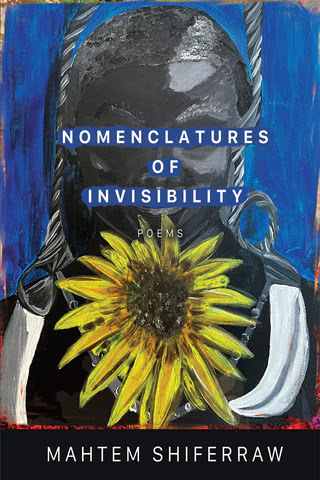Mahtem Shiferraw, Nomenclatures of Invisibility: Poems
The Eucalyptus Tree I
after Susan Hahn
I long for it on quietnights and call it
home. It stands tall andmuscular
above the mountains. It seesme
but does not flinch. It feedsme
honey and wild winds. It callsme
child, though I do nothear.
Its leaves, a balm forblistering skin;
what comes after a cry, or bleeding?
Its aroma, like autumn,like rain,
stands green, translucentthing,
between my father and I,and the ghosts
of Gojam. It sees us: bleeding.
We carve wombs throughoutits roots
and rest our littlebodies. We bear
children the size ofseeds and fold
them into our brancharms. The rings
of fire that embrace usare blue with fear.
Everywhere we go, wesmell of death
and something sweet.
 Thethird full-length collection by Mahtem Shiferraw, “a writer and visual artistfrom Ethiopia and Eritrea,” is
Nomenclatures of Invisibility: Poems
(RochesterNY: BOA Editions, 2023), following
Your Body Is War
(University of NebraskaPress, 2018) and Fuchsia (University of Nebraska Press, 2016), which wonthe Sillerman First Book Prize for African Poets. There is such a clarity, a concretenessand precision, in Shiferraw’s lyrics. I admire the scaffolding of her poems,one that allows a variety of gestures, whether a hand in the air, or a story, apicture, all of which holds firmly together in a solidly constructed space. “Weare made with the same thing,” she writes, as part of the poem “Sawdust,” “and/ we hum quietly. He is a fish too, telling / his daughters stories of men withlurking eyes. / We swim elsewhere and find him staring / into the open skies.He asks, what are we / doing here? He asks, are we really here alone?” She writesof grandmothers, historical truths, colonialism and cultural arrogance; shewrites of cultural truths, inheritances and children. “To be able to set acrossthe ocean, / across unnamed seas and other waters,” she writes, as part of “Wuchalle,”“and / lands, and suddenly, having arrived at the // coastal states, suddenlynot noticing / the existing communities, and instead, / deciding to takeownership—like that, / like that.” She writes what is seen and known and notknown in searing lyric, offering a clear through-line reflecting and meditatingon language, the self and the body in a cultural, communal and familial space. “Theseeds we plant are may, but / many more of us grow—,” she writes, to close thepoem “Crackling Blue,” continuing:
Thethird full-length collection by Mahtem Shiferraw, “a writer and visual artistfrom Ethiopia and Eritrea,” is
Nomenclatures of Invisibility: Poems
(RochesterNY: BOA Editions, 2023), following
Your Body Is War
(University of NebraskaPress, 2018) and Fuchsia (University of Nebraska Press, 2016), which wonthe Sillerman First Book Prize for African Poets. There is such a clarity, a concretenessand precision, in Shiferraw’s lyrics. I admire the scaffolding of her poems,one that allows a variety of gestures, whether a hand in the air, or a story, apicture, all of which holds firmly together in a solidly constructed space. “Weare made with the same thing,” she writes, as part of the poem “Sawdust,” “and/ we hum quietly. He is a fish too, telling / his daughters stories of men withlurking eyes. / We swim elsewhere and find him staring / into the open skies.He asks, what are we / doing here? He asks, are we really here alone?” She writesof grandmothers, historical truths, colonialism and cultural arrogance; shewrites of cultural truths, inheritances and children. “To be able to set acrossthe ocean, / across unnamed seas and other waters,” she writes, as part of “Wuchalle,”“and / lands, and suddenly, having arrived at the // coastal states, suddenlynot noticing / the existing communities, and instead, / deciding to takeownership—like that, / like that.” She writes what is seen and known and notknown in searing lyric, offering a clear through-line reflecting and meditatingon language, the self and the body in a cultural, communal and familial space. “Theseeds we plant are may, but / many more of us grow—,” she writes, to close thepoem “Crackling Blue,” continuing:these ones erect andunapologetic
small conquerors of oldworlds—
though, they too, mustcarry the
weight of distraughtancestors
like heavy rocks, sinkinginto their bones
deeper and deeper
until their cracklingturns blue.



